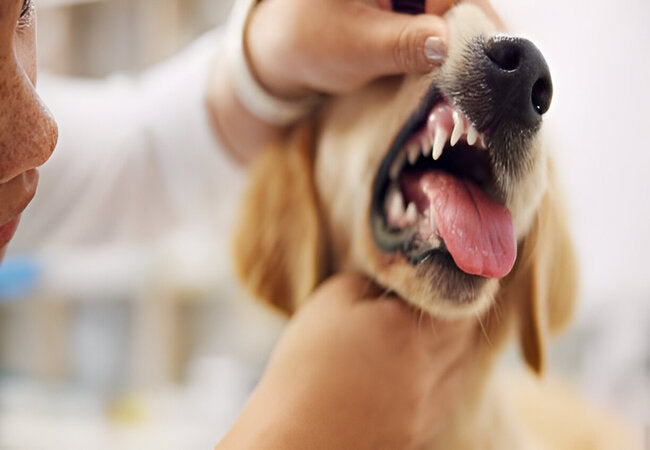Vet‑Led Guide to Dry Mouth in Pets 2025: Care, Causes & Relief 😬💧

In this article
Vet‑Led Guide to Dry Mouth in Pets 2025: Care, Causes & Relief 😬💧
By Dr. Duncan Houston BVSc
Dry mouth (xerostomia) in dogs and cats isn’t just unpleasant—it can be a sign of serious health issues. I’m Dr Duncan Houston BVSc, here to explain the causes, how to identify it, and modern 2025 solutions—including hydration methods, oral hygiene, medications, and lifestyle support. Let’s dive in! 🐾
🔍 Why Saliva Matters
Saliva moisturizes food, protects oral tissues, prevents bacterial overgrowth, fights infections, and helps with digestion. When saliva isn’t present, pets face bad breath, cracked tongue and gums, dental disease, pain, and trouble eating.
⚠️ Common Causes of Dry Mouth
Here are the usual causes your vet will consider:
- Dehydration: Most common—due to heat, illness, or insufficient water.
- Medications: Antihistamines, diuretics, sedatives, cancer drugs, antihypertensives, etc., can reduce saliva.
- Radiation therapy: For head/neck cancer—damages salivary glands.
- Autoimmune disease: Like Sjögren‑type conditions, the body attacks the salivary glands.
- Nerve damage: Trauma, tumors, and surgery can disrupt salivary control.
- Chronic disease: Diabetes, kidney disease, endocrine or cardiovascular problems may contribute.
👀 Signs of Dry Mouth You Should Watch For
- Sticky, tacky saliva or very thick drool
- Bad breath, plaque build-up, and bleeding gums
- Dry/cracked tongue and oral membranes
- Oral lesions, mouth pain, difficulty eating
- Poor appetite, reluctance to swallow, weight loss
If you see these, it’s time for a vet consult—dry mouth may point to underlying disorders.
💡 Diagnostic Steps Every Vet Follows
- Physical exam: Check oral tissues and hydration status
- Blood work: To assess organ function, hormones, and autoimmune markers
- Neurological & regional examination: Troubled salivary production or nerve dysfunction
- Medication history: Review all current drugs for side effects
- Salivary gland function tests: Uses diagnostic atropa drops or gland imaging in complex cases
🛠️ Treatment: Fix & Support
1. Treat the Underlying Cause
Correcting dehydration, adjusting medications, managing autoimmune diseases or addressing nerve injuries can bring saliva back to normal.
2. Oral Hydration & Diet
- Always provide fresh water and use water fountains in hot seasons
- Serve moist foods or broths to encourage moisture intake
- Consider palatable wet food or slurries, especially post-radiation
3. Saliva Stimulants & Medications
Pilocarpine may be prescribed to help stimulate saliva, usually before meals. In autoimmune cases, immunosuppressives like prednisone or cyclosporine may improve saliva production.
4. Oral Hygiene & Supportive Products
- Daily brushing and professional cleanings
- Use pet-safe mouthwashes, such as chlorhexidine rinses, gels, or Oratene additive
- Include enzymes or antiseptic additives in water to reduce bacteria
5. Follow-Up & Ongoing Monitoring
Regular vet checkups, oral exams, and adjusting care as needed—especially when taking medications or undergoing radiation therapy.
🧩 2025 Home Care & Lifestyle Tips
- Check your mouth weekly for changes
- Offer cozy food bowls and easy-to-chew meals
- Encourage grooming and oral enrichment for comfort
- Use Ask A Vet and Purrz for monitoring and supportive advice
- Take part in virtual vet follow-ups for early symptom detection
🏥 When to See the Vet Immediately
- Refusal to eat, rapid weight change, obvious pain during chewing
- Persistent halitosis, bleeding, or oral sores
- Neurologic signs—facial paralysis, drooping, and swallowing difficulty
- Severe dehydration with lethargy or weakness
✅ Final Takeaways
- Dry mouth isn’t just drool: it’s a symptom that needs attention.
- Identifying and treating underlying causes is the core; hydration follows.
- Use supportive oral care: hygiene, stimulants, and safe water additives.
- Integrate the Ask A Vet app and Purrz solutions for consistent home care and comfort.
- Early diagnosis and proactive management make all the difference.






